- Mon - Sat 8:00 - 6:30, Sunday - CLOSED
- support@soundproofhub.com
How to Soundproof a Basement
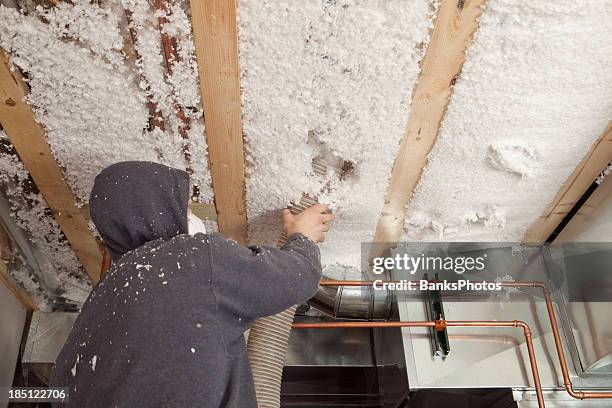
How to Soundproof a Basement
Soundproofing your basement can transform it into a quiet retreat, whether you’re creating a music room, home theater, or office in noisy spaces. This guide will walk you through “how to soundproof a basement” or “soundproof basement ceiling without drywall” effectively using various materials and techniques.
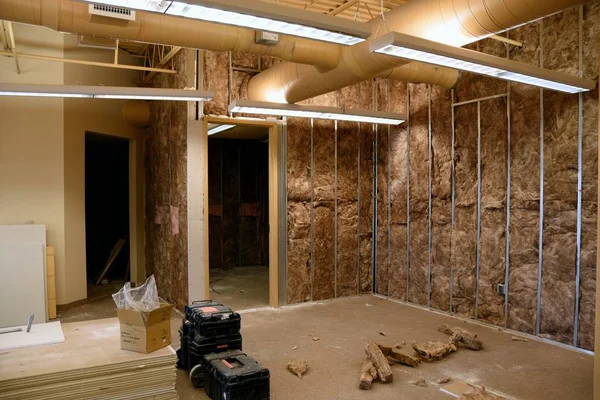
Depositphotos
Why Soundproofing Your Basement Matters
Basements often serve multiple purposes—from workshops and music studios to bedrooms and home theaters. However, they can also be noise disturbance sources for the rest of the house or your neighbors. Soundproofing helps:
- Reduce noise transmission to upper floors.
- Enhance privacy in basement rooms.
- Improve the functionality of the space for specific purposes like recording or relaxing.
Key Areas to Soundproof in Your Basement
1. Soundproofing the Basement Ceiling
Soundproofing the ceiling minimizes noise transfer between the basement and upper floors.
-
Acoustic Panels Basement Ceiling
Installing acoustic panels in the basement can absorb unwanted sound waves and reduce echo. Buy the best soundproof basement ceiling tiles at cheap prices from Armstrong World Industries, Kanopi by Armstrong, Sonex online, Amazon acoustical ceiling, and Acoustical Solutions.
-
Soundproof Basement Ceiling Without Drywall
For less invasive options, use acoustic insulation or soundproof basement ceiling tiles, such as acoustic panels, ceiling baffles, mass-loaded vinyl (MLV), resilient sound isolation clips (RSIC-1), green glue, Acoustic caulk, and Fiberglass insulation.
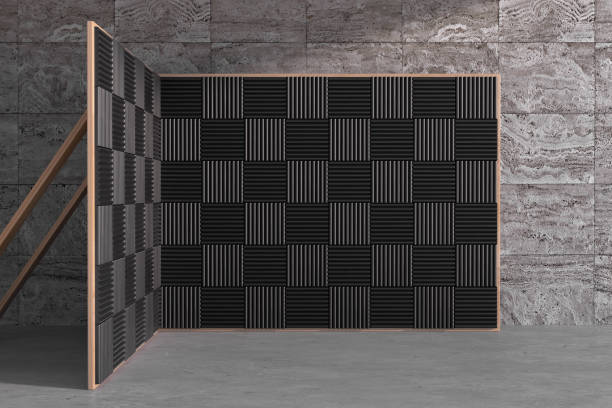
IStock” Vocal or Music Recording Room with Dampening Acoustic Foam Panel Walls extreme closeup. 3d Rendering
-
DIY Soundproof Basement Ceiling
- Consider filling the ceiling joists with soundproofing materials like mineral wool or fiberglass insulation.
-
Soundproof Basement Ceiling Cheap
- Use mass-loaded vinyl (MLV) for a cost-effective solution.
-
Soundproof Exposed Basement Ceiling
Attach acoustic insulation directly to the exposed joists.
2. Soundproofing Basement Walls
The walls play a vital role in containing noise within the basement.
- Use soundproofing basement insulation to block sound transmission.
- Install double layers of drywall with a soundproofing compound like Green Glue in between.
- Add acoustic panels to the walls for additional sound absorption.
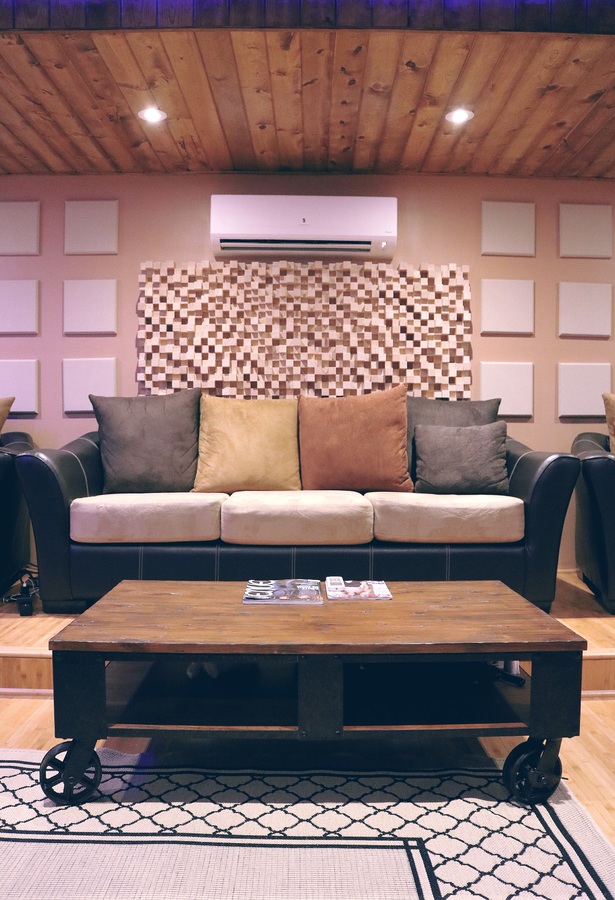
gharpedia
3. Soundproofing Basement Floors
To prevent noise from travelling upwards:
- Use basement soundproofing material like cork or rubber flooring.
- Add a soundproofing underlayment beneath your existing floor.
4. Soundproofing Basement Doors and Windows
- Install a soundproof basement door with a solid core.
- Add weatherstripping or a door sweep to seal gaps.
- Use soundproof curtains or inserts for basement windows.
5. Soundproofing Basement Vents and Ductwork
HVAC systems can carry noise throughout the house. To soundproof:
- Cover vents with acoustic foam.
- Wrap ductwork with soundproofing materials to reduce vibrations.
6. Soundproofing Basement Stairs
Soundproofing stairs can prevent noise from escaping the basement.
- Add carpet or rugs to absorb sound.
- Install acoustic underlays beneath the stairs.
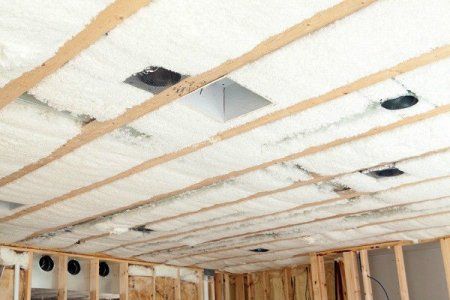
Step-by-Step Guide to Soundproofing a Basement Ceiling, Walls, and Floor
Step 1: Assess Your Basement’s Needs
Determine the space’s purpose and identify the primary sources of noise. For instance, a soundproof basement music room will require more robust measures than a standard home office.
Step 2: Choose the Right Materials
- Acoustic insulation basement ceiling: Ideal for reducing noise from the basement ceiling.
- Mass-loaded vinyl: A versatile material for walls, floors, and ceilings.
- Acoustic tiles basement: Perfect for ceilings and walls to absorb sound waves.
Step 3: Install Soundproofing Solutions
- For ceilings: Use soundproof existing basement ceiling methods, such as adding insulation or drywall.
- For walls: Add acoustic panels or create a double-layered wall with Green Glue.
- For floors: Lay down soundproof underlayment or carpet.
Step 4: Seal Gaps and Cracks
Even small gaps can allow noise to travel. Use acoustic sealant to fill cracks and openings around windows, doors, and vents.
Step 5: Test and Adjust
After installing soundproofing materials, test the effectiveness by playing music or generating noise. Make adjustments as needed.

FAQs
1. How do I soundproof my basement ceiling without drywall?
You can use acoustic insulation or soundproof basement ceiling tiles for effective results.
2. Can you soundproof a basement music room?
Yes, using acoustic panels and soundproofing insulation will create an ideal environment for music production.
3. How much does it cost to soundproof a basement?
The cost varies depending on the materials and methods used. The cost of a soundproof basement ceiling can range from $500 to $2,000.
4. Are basements soundproof by default?
No, basements are not naturally soundproof. You’ll need to add materials like insulation and acoustic panels.
5. How to soundproof basement vents?
Cover vents with acoustic foam or wrap ductwork with soundproofing materials to minimize noise transmission.
6. What’s the best soundproofing material for a basement?
Mass-loaded vinyl and acoustic insulation are highly effective for most applications.
Final Thoughts
Soundproofing a basement can significantly enhance its functionality and comfort. Whether you’re setting up a home theater, music studio, or bedroom, following these steps will help you achieve a quieter and more private space.




Muhammad Zeeshan
Muhammad Zeeshan is an SEO expert specializing in link building (SaaS, Tech, Business, and Home Improvements). I am very passionate about search engine optimization, backlink building, and guest blogging. I can help you in attracting a new audience and in achieving a higher rating.